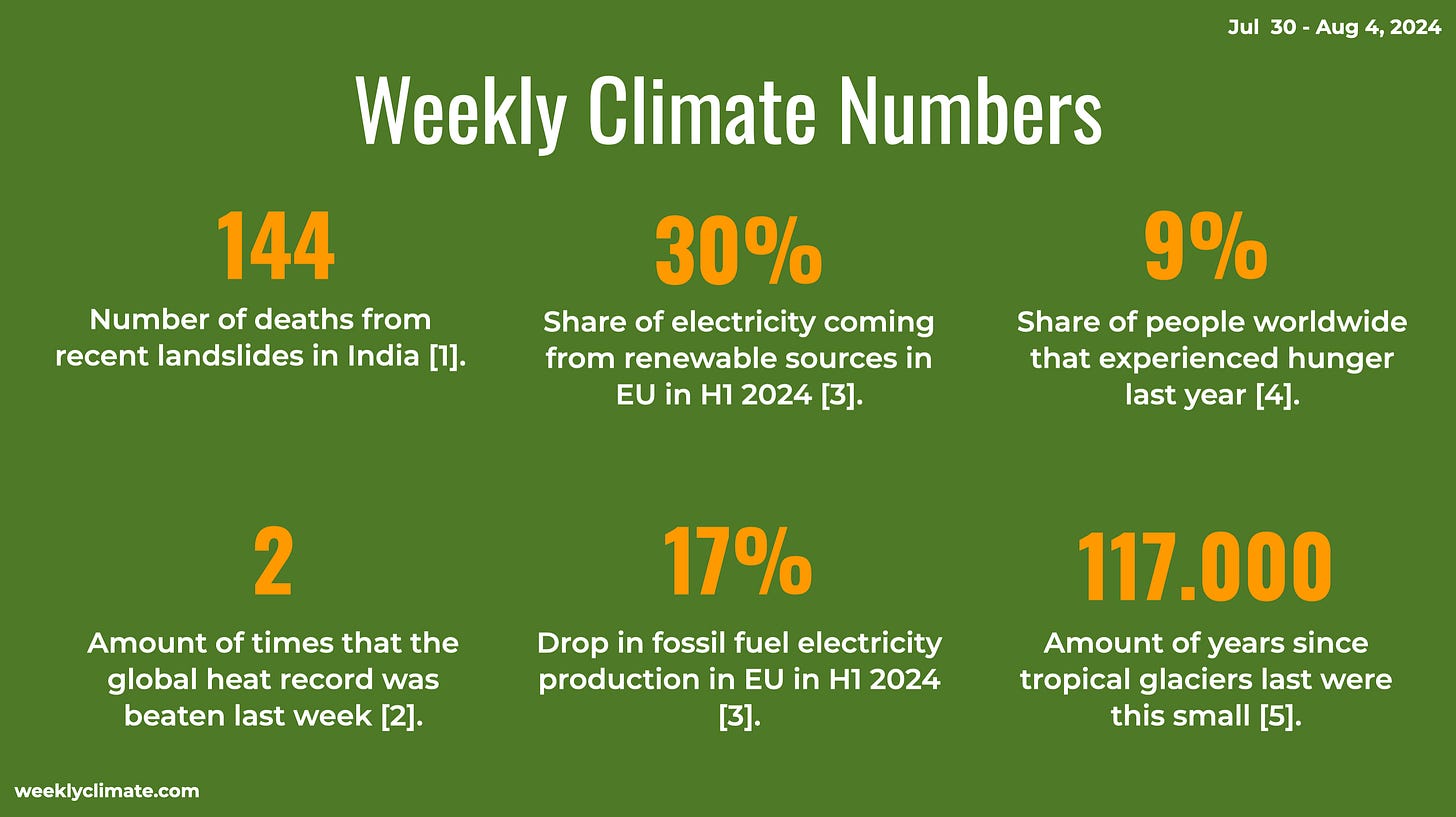[Jul 30-Aug 4'24] Every 0.1C counts
Plants and pollinators out of sync, wind and solar wins in EU and how to stop a new kind of climate denial
Welcome to this week’s edition of The Weekly Climate 🎉
References: [1], [2], [3], [4] and [5].
Last week there was no newsletter due the fact that it was my birthday on Sunday and I didn’t manage to write the newsletter in time. Sorry about that.
This week however, saw almost double the amount of articles I usually scan. And you know it’s been a busy week when a new report saying that 9% of people experienced hunger last year doesn’t make it to the list of news you can’t miss or the fact that a global heat record was beaten 2x in a row last week.. 😰
‼️News you can’t miss
Here’s one important scary/bad (🙀), good (😻), interesting (😼) and fossil (💩) news item.
🙀 Plants and pollinators more and more out of sync
😻 Wind and solar over take fossil fuels in EU in H1 2024
💩 How to stop a new kind of climate denial
👩⚕️ Status: Climate & Science
Let’s look at how we’re doing this week!
[#everyCcounts] — Research indicates that every 0.1°C of global temperature overshoot above 1.5°C increases the risk of crossing critical tipping points in the Earth's system. The study highlights that longer and higher breaches of the 1.5°C threshold significantly raise the likelihood of tipping, with a 45% chance of crossing tipping points by 2300 under a scenario where temperatures peak at 3.3°C. The risk escalates further beyond 2°C, emphasizing the urgent need for immediate emission reductions to avoid severe climate impacts.
[#andesglacier] — A new study reveals that tropical glaciers in the Andes are the smallest they have been in 11,700 years, with significant implications for local communities dependent on glacial meltwater and broader climate change concerns. Researchers used cosmogenic nuclide dating to analyze bedrock samples, confirming unprecedented glacier retreat. The findings raise questions about the future of glaciers in the region and their critical role as water sources, highlighting the urgent need for adaptation strategies as climate conditions evolve.
[#2xheatrecords] — Global temperatures reached a new record high on July 21, 2024, only to be surpassed the next day, with NASA reporting a global average of over 17 degrees Celsius. This trend reflects a year of unprecedented heat, with July 2023 being the hottest month on record since 1880. The extreme temperatures have prompted changes in heat risk assessments by weather and health agencies, and AI models predict further catastrophic climate impacts by mid-century.
[#glacierrobot] — An undersea robot named Ran has mapped the underside of the Dotson Ice Shelf in Antarctica, revealing complex formations that provide insights into ice shelf melting, which is crucial for understanding global sea level rise. The findings include unique structures shaped by currents, challenging previous assumptions about underwater ice topography. Despite some missions being unsuccessful, the data collected is expected to inform future research, particularly regarding the nearby Thwaites Glacier, which poses a significant risk to sea levels.
📰 The 7 Grand Challenges
⚡️Decarbonize Electricity
Clean electricity is the one do-or-die challenge we must solve.
[#diysolar] — In Germany, lightweight plug-and-play solar panels are gaining popularity as people install them easily without professional help. The country has seen over 500,000 installations, driven by lower prices and relaxed regulations. These panels, which can be plugged into standard wall sockets, allow individuals to generate their own electricity, contributing to a broader shift towards renewable energy. As Germany aims to increase its solar capacity significantly by 2030, the trend is supported by a growing interest in sustainability among diverse demographics.



